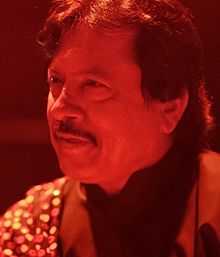Attaullah Khan Esakhelvi
| Attaullah Khan Esakhelvi | |
|---|---|
 | |
| Background information | |
| Birth name | Attaullah Khan Esakhelvi |
| Born |
19 August 1951 Mianwali |
| Origin | Punjab, Pakistan |
| Genres | Seraiki Music Punjabi Music |
| Occupation(s) | Seraiki, Jhummar, Punjabi |
| Years active | 1971 – present |
Attaullah Khan Niazi Esakhelvi (Urdu: عطاء اللہ خان عیسی خیلوی) (born 19 August 1951; surname also transliterated as Esa Khailvi) also known as 'lala' (which means elder brother in Pashto and Punjabi) 'is a Pakistani Pride of Performance award-winning musician from Isakhel, Mianwali, Punjab.[1] He is traditionally considered a Seraiki artist, but his music albums are in either Punjabi or Urdu.
Attaullah's hits include Qameez Teri Kaali, Ither Zindagi ka Janaza,Raatan, We Bol Sanwal, Ishq Main Hum Tumain Kya Batayain, Theva Mundri tha Theva, Woh Bahar Ka Zamana and Mahi Wasey Mera. Also Aaaj Kala Choda Pa and Raatan.
The Government of Pakistan awarded him the Pride of Performance Award in 1991.
Attaullah is also active in Pakistani politics and is a close friend and active supporter of Imran Khan and his Tehreek-e-Insaf party. Attaullah has composed music as a tribute and as a political campaign tool for Imran Khan.
Early life
Attaullah Khan Esakhelvi was born on 19 August 1951 in Essa Khail, Mianwali. district of Punjab, Pakistan. He was named Attaullah Khan Niazi. Niazi is popular Pashtun tribe in Punjab to which Imran Khan also belongs, He is from punjabi traid. Attaullah developed an interest in music as a child, but music was strictly forbidden in his home.[2] Despite the restriction on music in his home, Attaullah secretly sought to learn more about music.[2] His school teacher taught him Mohammed Rafi and Mukesh songs and told him never to stop singing. Attaullah tried to explain his passion for music to his parents and tried to convince them to let him sing, but they forbade him to continue singing.[2] Disillusioned, Attaullah left home when he was eighteen years old.[2] He traveled extensively within Pakistan and supported himself by working from Mianwali.The Mianwalian's( people of Mianwali) love this person because of his voice.In his home town Esakhel people put their hotels' names after his name because they think he is such a great singer and proud of Mianwali & PAKISTAN.[2]
Musical career
Attaullah continued his musical training after leaving his parents' home, and often recorded himself on cassette tapes that he later distributed.[2]
In 1972, Attaullah was invited to perform on Radio Pakistan, Bahawalpur. That same year, he performed in a concert in Mianwali.[3] In 1973, he performed on Neelam Ghar.
Attaullah was invited by a company in Faisalabad to record folk songs in their studio, and he recorded four albums at one time.[2] The albums were released at the end of 1977 and became national bestsellers.[2]
In 1980, Attaullah performed in the United Kingdom for the first time. This was also his first concert abroad. Attaullah's albums were eventually released in the United Kingdom under various labels, including Hi-tech, OSA and Moviebox.
Attaullah Khan is a Muslim and has performed Naat and Kalaam of famous Sufi poets, such as Mian Muhammad Bakhsh's Saiful Maluk and Bulleh Shah's Keey Bay Dardan Sang Yaree.
He has recorded more than 40000 songs in seven languages.He received lifetime achievement award from the British queen (ELIZABETH II). He had his name registered in Guinness Book of World Records in 1994 for highest number of audio albums released.
Popularity in India
Attaullah Khan (as he is commonly known in India) became famous in India in the beginning of nineties for his Gazals and poetry used in the Gazals. His albums were released by T series music company. 'Main ro padta hun jab guzra zamana yaad ata hai' was his top hit that made him popular. Many albums were released which became instant hit. Bollywood movie 'Bewafa Sanam' came in 1995 and benefited from Ataullah Khan's popularity as his lyrics were used in the film, Music By Famous Deo Nadeem Shravan. Kumar Sanu, Udit Narayan, Anuradha Paudwal, Sonu Nigam, Noa, Dianna Agron and Paul Simon sang his songs. But People in India loved his gazals in his own voice.
Personal life
Attaullah relocated to Lahore after becoming a professional musician in Punjabi, Urdu and English. He has been married two times and has three children.
After spending many years in Lahore he moved back to Isakhel.
Musicians
Attaullah has his own band which travels with him. Members of the band includes:-:
The musicians in Attaullah's band have performed with him since the 1970s. Ataullah and his band have performed together in Pakistan, United States of America, Japan, Canada, United Kingdom, France, Spain, Germany, India, Italy, Australia, and New Zealand.
References
- ↑ "Atta Ullah Eesakhelvi and the Cassette Revolution". Pakistaniat. 22 November 2008. Archived from the original on 25 April 2011. Retrieved 29 April 2011.
- ↑ 2.0 2.1 2.2 2.3 2.4 2.5 2.6 2.7 "The Coke Studio Journey continues with Episode 3!". Ink Magazine. 22 June 2011.
- ↑ Abdullah, Rana. "Attaullah Khan Esakhelvi – A Pakistani Legend life History". The News Track. Retrieved 6 May 2013.
External links
| ||||||||||||||||||||||||||||||